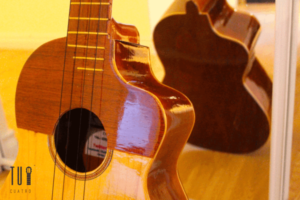Scales are musical notes played in a specific order, typically ascending or descending. They are used to provide a framework for melody and harmony in music. Playing scales on the ukulele is a great way to improve finger dexterity and familiarity with the instrument.
To play a scale on the ukulele, start by selecting the key you want to play in. This will determine the notes used in the scale. Next, decide which type of scale you want to play. The most common scales for the ukulele are the major and minor scales.
Once you have selected the key and type of scale, use the ukulele’s fretboard to play the scale’s notes in sequence. For example, to play a C major scale, you would play the notes C, D, E, F, G, A, B, C, starting on the first fret of the fourth string and moving up the fretboard one note at a time.
Scales in music are beneficial for learning how each chord is constructed. Also, the scales help create melodies and play solo parts without the fear of making a mistake. Learn to play a few scales, major and minor, so you can start playing solos and melodies confidently, enhancing your technique while you play a song on Ukulele, and impressing your friends with your playing.
Major Scales
For a beginner, the major scale is typically easier to learn than the minor one. This is because the major scale uses only whole steps between the notes, whereas the minor scale combines whole and half steps. This makes the major scale more straightforward to play and easier to remember.
All major scales for Ukulele are shown in the tables below. Grab your Ukulele and try to play the notes illustrated on each fretboard. The purple dot indicates the keynote for each scale so that you can return to the key anywhere you are on the fretboard.
A major

B major

C major

D major

E major

F major

G major

Minor Scales
It is not necessarily more challenging to learn the minor scales if you don’t know the major ones first, but it can be helpful to understand the major scale before moving on to the minor scale. This is because the major and minor scales share many of the same notes, so knowing the major scale can provide a helpful reference point for learning the minor scale.
Additionally, understanding the difference between whole and half steps, which is emphasized in the major and minor scales, can provide a strong foundation for learning other types of scales and musical concepts. So while it is not strictly necessary to learn the major scales first, it can benefit some learners.
Now let’s try the same exercises but with the minor scales. Minor scales have a variation at the 3rd note for each scale and a few other slight variations. Try learning the major scales by heart first, and then playing minor scales will be easier, as you’ll know where not to place your fingers to produce a note belonging to the major scale.
Grab your Ukulele again, and let’s start playing minor scales:
A minor

B minor

C minor

D minor

E major

F minor

G minor

It’s important to practice playing scales slowly and accurately, paying attention to the correct finger placement on the fretboard. As you become more comfortable with the scale, you can increase the tempo and add different strumming patterns to add variety to your playing.
Overall, practicing scales on the ukulele can improve your understanding of music theory and help you become a better player. It’s a valuable exercise for any ukulele player, whether you’re a beginner or an experienced musician.



































